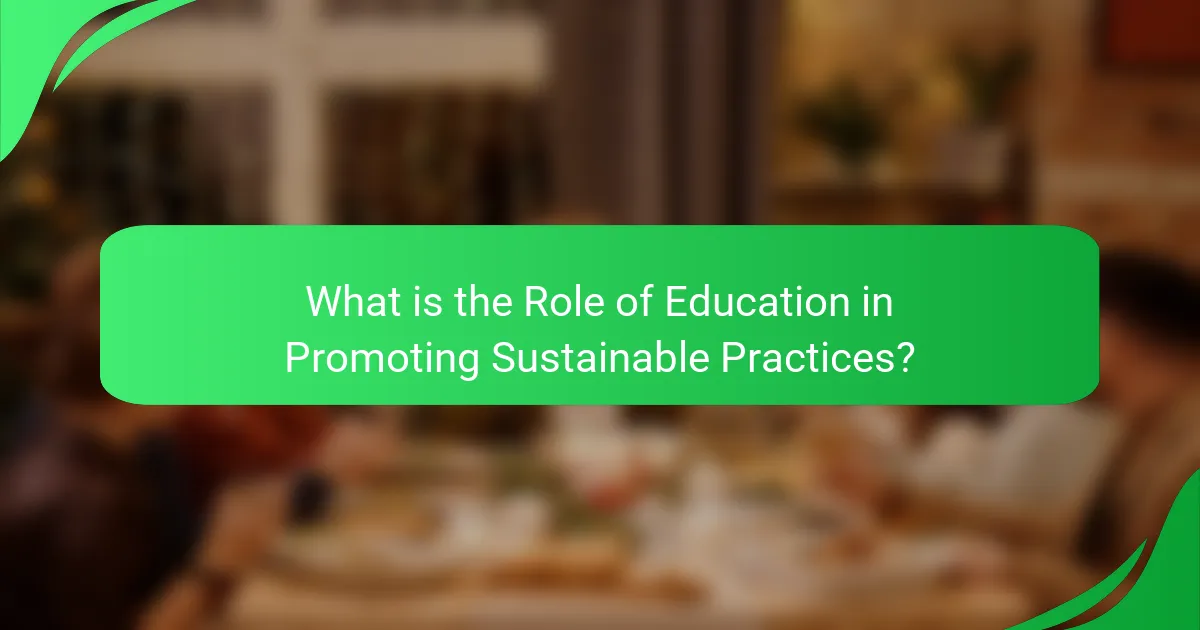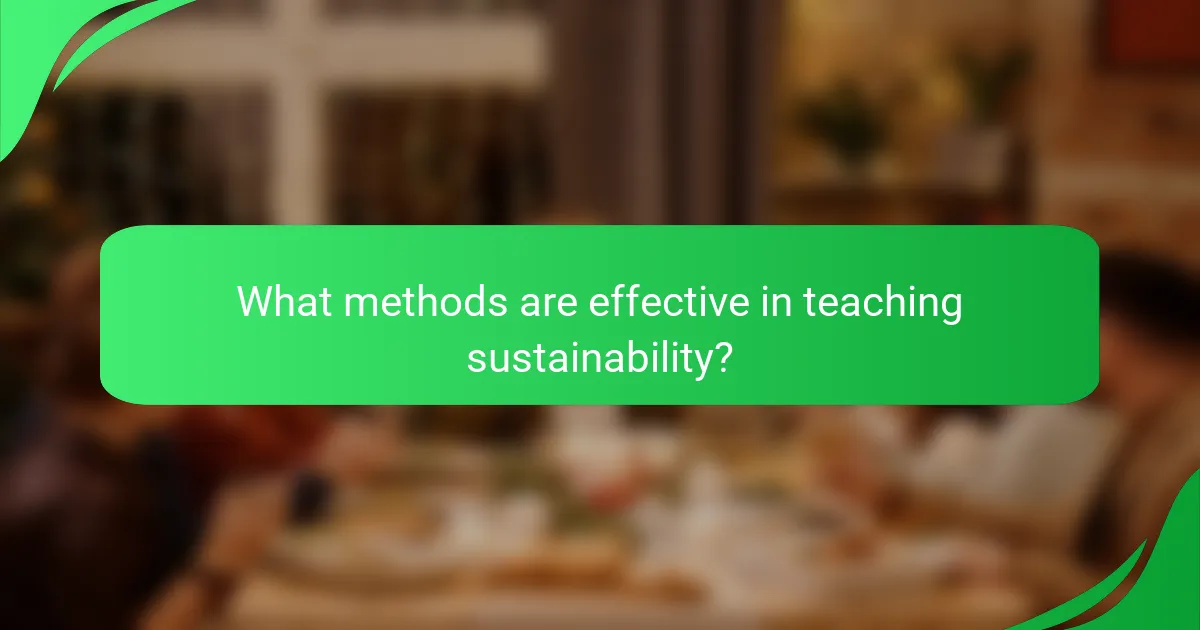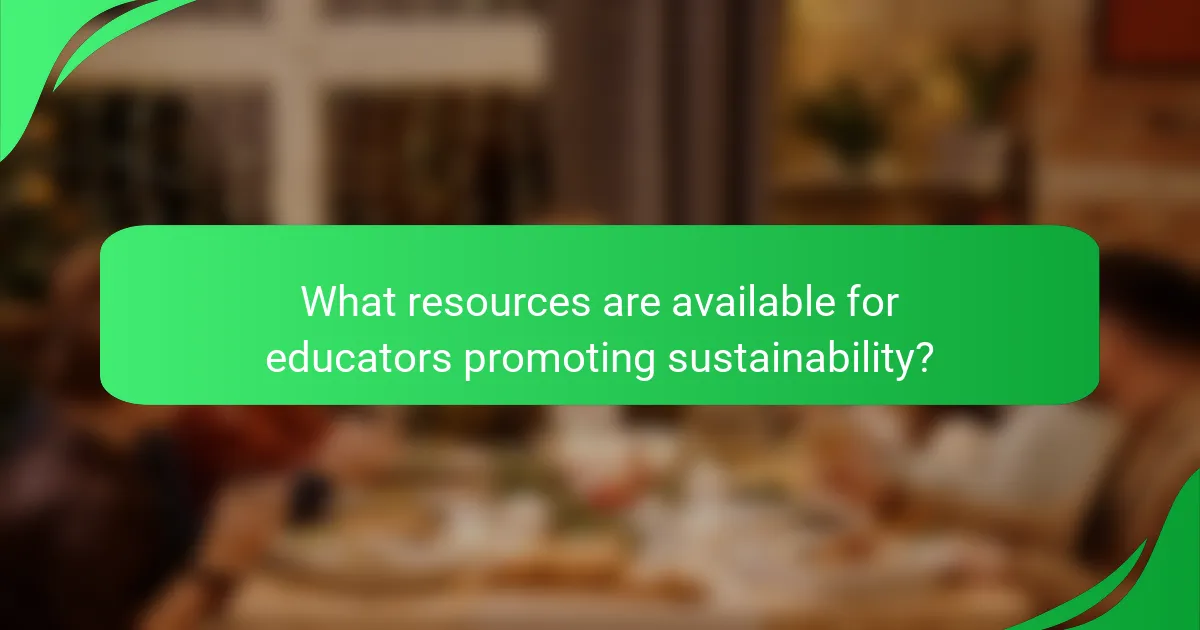Education is a critical factor in promoting sustainable practices, as it provides individuals with the necessary knowledge to understand and address environmental issues. The article explores various methods of teaching sustainability, such as experiential learning and collaborative projects, which enhance retention and engagement. It highlights the benefits of environmental education, including increased recycling rates and eco-friendly behaviors among educated individuals. Additionally, the article outlines available resources for educators, including online platforms and frameworks that support the integration of sustainability into curricula. Overall, education is positioned as a vital catalyst for fostering responsible environmental behavior and advocating for sustainable policies.

What is the Role of Education in Promoting Sustainable Practices?
Education plays a crucial role in promoting sustainable practices. It equips individuals with the knowledge needed to understand environmental issues. Through education, people learn about the impact of their actions on the planet. This understanding fosters responsible behavior towards natural resources. Schools and universities often incorporate sustainability into their curricula. Programs focus on topics such as conservation, renewable energy, and waste reduction. Research indicates that educated individuals are more likely to engage in sustainable behaviors. For example, a study by the National Environmental Education Foundation found that environmental education increases pro-environmental actions. Education thus serves as a foundation for a sustainable future.
How does education influence sustainable behavior?
Education significantly influences sustainable behavior by increasing awareness and understanding of environmental issues. It equips individuals with knowledge about the impact of their actions on the planet. Research shows that educational programs can lead to increased recycling rates and energy conservation. For instance, a study by the National Environmental Education Foundation found that environmental education can enhance sustainable practices in communities. Furthermore, education fosters critical thinking skills, enabling individuals to make informed decisions. It also encourages civic engagement, leading to community-driven sustainability initiatives. Overall, education serves as a catalyst for positive behavioral change towards sustainability.
What educational models support sustainability?
Experiential learning models support sustainability by engaging learners in hands-on experiences. These models emphasize real-world problem-solving and critical thinking. Project-based learning is another effective approach. It allows students to work on sustainability-focused projects, fostering collaboration and innovation. Inquiry-based learning encourages students to ask questions and explore sustainability issues deeply.
Service learning integrates community service with academic study, promoting civic responsibility and environmental stewardship. The UN’s Education for Sustainable Development (ESD) framework also guides educational practices toward sustainability. It emphasizes holistic approaches that connect environmental, social, and economic dimensions.
These educational models collectively enhance awareness and action toward sustainable practices. They prepare learners to address complex sustainability challenges in their communities and beyond.
How do different age groups respond to sustainability education?
Different age groups respond to sustainability education in varied ways. Younger individuals, particularly children and teenagers, often show higher enthusiasm and adaptability to sustainability concepts. They are influenced by interactive and engaging teaching methods. Research indicates that hands-on activities significantly enhance their understanding. Adults generally respond based on prior knowledge and personal values. Many adults express interest in sustainability but may struggle with implementation. Older adults often have established habits, making change more challenging. However, they can be motivated by clear benefits and community involvement. Studies suggest that tailored approaches improve effectiveness across all age groups.
Why is education vital for sustainable development?
Education is vital for sustainable development because it empowers individuals with knowledge and skills. This knowledge enables informed decision-making regarding environmental, economic, and social issues. Educated individuals can advocate for sustainable practices and drive innovation. According to UNESCO, education fosters critical thinking and promotes awareness of sustainability challenges. Furthermore, the UN Sustainable Development Goals emphasize quality education as a key factor in achieving sustainability. Studies show that higher education levels correlate with greater environmental stewardship. Thus, education serves as a foundational pillar for creating a sustainable future.
What are the key principles of sustainability education?
The key principles of sustainability education include systems thinking, interdisciplinary learning, and critical thinking. Systems thinking emphasizes understanding the interconnectedness of ecological, social, and economic systems. This principle helps learners recognize the impact of their actions on the environment. Interdisciplinary learning integrates knowledge from various subjects to solve complex sustainability issues. It fosters a holistic view of challenges and encourages collaboration. Critical thinking promotes questioning and evaluating information about sustainability. This principle empowers learners to make informed decisions. Together, these principles create a comprehensive framework for effective sustainability education.
How does sustainability education impact community engagement?
Sustainability education enhances community engagement by fostering awareness and collective action. It equips individuals with knowledge about environmental issues. This knowledge encourages participation in community initiatives. Studies show that communities with sustainability education programs report higher volunteerism rates. For example, a 2020 report from the National Environmental Education Foundation found that 70% of participants engaged in local environmental projects. Additionally, sustainability education promotes collaboration among diverse community members. This collaboration leads to innovative solutions for local sustainability challenges. Overall, sustainability education serves as a catalyst for active community involvement and environmental stewardship.

What methods are effective in teaching sustainability?
Experiential learning methods are effective in teaching sustainability. These methods involve hands-on activities that engage learners directly with sustainability concepts. Examples include community gardening, recycling projects, and field trips to sustainable farms. Research shows that experiential learning increases retention and understanding of sustainability principles. A study from the Journal of Environmental Education found that students participating in hands-on projects demonstrated a 30% increase in knowledge retention compared to traditional lectures. Collaborative projects also enhance learning by fostering teamwork and problem-solving skills. Incorporating technology, such as simulations and interactive platforms, further enriches the learning experience. Overall, these methods create a deeper connection to sustainability practices.
What teaching strategies promote sustainable practices?
Interactive learning promotes sustainable practices effectively. This strategy engages students in hands-on experiences. Activities like gardening or recycling projects foster a connection to the environment. Collaborative projects enhance critical thinking and problem-solving skills. These skills are essential for addressing sustainability challenges. Research indicates that experiential learning increases environmental awareness. A study by the National Environmental Education Foundation found that students involved in such activities show greater commitment to sustainable behaviors. Integrating technology in teaching also supports sustainability education. Digital platforms can simulate environmental impacts and solutions. This approach makes learning relevant and impactful.
How can experiential learning be applied to sustainability education?
Experiential learning can enhance sustainability education by providing hands-on experiences that connect theory to practice. This approach allows students to engage directly with environmental challenges. They can participate in projects like community gardens or recycling initiatives. Such activities foster a deeper understanding of sustainability concepts. Research indicates that students retain information better when actively involved. A study by Kolb (1984) emphasizes the effectiveness of experiential learning in education. This method encourages critical thinking and problem-solving skills. Ultimately, it prepares students to address real-world sustainability issues.
What role does technology play in sustainability education?
Technology enhances sustainability education by providing innovative tools and resources. It facilitates access to information through online platforms and digital resources. Virtual simulations allow students to explore environmental impacts in real-time. Mobile applications can track personal carbon footprints, promoting awareness. Interactive learning environments engage students in sustainability topics effectively. Data analytics helps educators assess the effectiveness of sustainability programs. Furthermore, technology enables collaboration among students globally, fostering a shared commitment to sustainability. Research by the National Environmental Education Foundation shows that technology-integrated education increases student engagement and retention in sustainability topics.
How can educators measure the effectiveness of sustainability education?
Educators can measure the effectiveness of sustainability education through various assessment methods. These methods include pre-and post-assessments to gauge knowledge gains. Surveys can capture students’ attitudes toward sustainability before and after the course. Observations of student engagement during activities provide qualitative insights. Projects can demonstrate practical application of learned concepts. Additionally, feedback from students can indicate how well the material resonated with them. Research shows that active learning techniques enhance retention of sustainability concepts. A study by the National Environmental Education Foundation found that hands-on experiences significantly improve understanding. These approaches collectively offer a comprehensive evaluation of sustainability education’s impact.
What assessment tools are available for sustainability education?
Assessment tools available for sustainability education include the Sustainability Literacy Test, the Ecological Footprint Calculator, and the Green Schools Assessment. The Sustainability Literacy Test evaluates knowledge of sustainability concepts and practices. The Ecological Footprint Calculator measures individual or organizational impact on the environment. The Green Schools Assessment focuses on sustainability practices within educational institutions. These tools provide measurable insights into sustainability understanding and application. They are widely recognized in educational settings for promoting sustainable practices.
How can feedback improve sustainability teaching methods?
Feedback can enhance sustainability teaching methods by providing insights into student understanding and engagement. It allows educators to identify areas where students struggle. This targeted information helps in refining teaching strategies. For instance, surveys and assessments can reveal misconceptions about sustainability concepts. Adjusting lesson plans based on this feedback can lead to more effective learning outcomes. Research shows that feedback improves student performance by 20% in educational settings. Regular feedback loops foster a collaborative learning environment. This encourages active participation and critical thinking among students. Ultimately, feedback aligns teaching methods with sustainable education goals.

What are the benefits of promoting sustainable practices through education?
Promoting sustainable practices through education enhances environmental awareness and fosters responsible behaviors. Educated individuals are more likely to adopt eco-friendly habits. This leads to reduced waste and lower carbon footprints. Studies show that environmental education can significantly increase recycling rates. For instance, a 2019 study found that schools implementing sustainability curricula saw a 30% increase in recycling participation among students. Furthermore, educated communities are better equipped to advocate for sustainable policies. This advocacy can influence local governments to adopt greener practices. Overall, education serves as a catalyst for widespread sustainable change.
How does sustainability education benefit individuals?
Sustainability education benefits individuals by enhancing their understanding of environmental issues. It equips them with knowledge about resource conservation and sustainable practices. Individuals learn to make informed decisions that positively impact the environment. This education fosters a sense of responsibility towards ecological stewardship. Research indicates that sustainability education increases awareness of climate change and its effects. A study by UNESCO found that informed individuals are more likely to engage in sustainable behaviors. Additionally, sustainability education can improve critical thinking and problem-solving skills. These skills are essential for addressing complex environmental challenges.
What skills do learners gain from sustainability education?
Learners gain critical thinking, problem-solving, and collaboration skills from sustainability education. These skills are essential for addressing complex environmental challenges. Critical thinking enables learners to analyze sustainability issues from multiple perspectives. Problem-solving skills help them develop innovative solutions for real-world problems. Collaboration skills foster teamwork and communication among diverse groups. Research by the United Nations Educational, Scientific and Cultural Organization (UNESCO) highlights that sustainability education enhances these competencies. This approach prepares learners to engage effectively in sustainable practices.
How does sustainability education contribute to personal responsibility?
Sustainability education fosters personal responsibility by equipping individuals with knowledge about environmental impacts. It encourages critical thinking regarding consumption and resource use. Students learn the importance of sustainable practices in daily life. This education instills values that promote eco-friendly decisions. Research indicates that individuals exposed to sustainability concepts are more likely to engage in responsible behaviors. For instance, a study by the National Wildlife Federation found that sustainability education increases recycling rates among students. Thus, sustainability education directly enhances personal accountability in environmental stewardship.
What societal benefits arise from sustainability education?
Sustainability education fosters environmental awareness and responsible citizenship. It equips individuals with knowledge about ecological impacts and resource management. This education encourages sustainable practices within communities. Studies show that communities engaged in sustainability education experience reduced waste and improved local ecosystems. For example, a report by the National Environmental Education Foundation highlights that schools implementing sustainability programs see a 20% decrease in energy use. Additionally, sustainability education promotes social equity by addressing environmental justice issues. It empowers marginalized groups to advocate for their rights and participate in decision-making. Overall, sustainability education leads to healthier communities and a more sustainable future.
How does sustainability education influence policy-making?
Sustainability education significantly influences policy-making by shaping public awareness and knowledge. Educated individuals are more likely to advocate for sustainable practices. They can effectively communicate the importance of environmental issues to policymakers. Research shows that communities with strong sustainability education programs often see more progressive environmental policies. For example, a study by the National Environmental Education Foundation found that increased environmental literacy correlates with stronger local sustainability initiatives. Additionally, sustainability education fosters critical thinking, enabling citizens to engage in informed discussions about policy options. This engagement can lead to more responsive and responsible governance regarding environmental challenges.
What role does education play in fostering environmental stewardship?
Education plays a crucial role in fostering environmental stewardship. It equips individuals with knowledge about environmental issues. This knowledge encourages responsible behavior towards the environment. Educational programs can raise awareness about sustainability. They can teach the importance of conservation and biodiversity. Studies show that students exposed to environmental education are more likely to engage in eco-friendly practices. For instance, a 2018 study by the National Environmental Education Foundation found that 90% of students who received environmental education felt more responsible for protecting the environment. This demonstrates that education significantly influences attitudes and actions related to stewardship.

What resources are available for educators promoting sustainability?
Educators promoting sustainability have access to various resources. These include online platforms like the National Geographic Education, which provides lesson plans and activities focused on environmental issues. The United Nations offers the “Education for Sustainable Development” framework, helping educators integrate sustainability into their curricula. Additionally, the Environmental Protection Agency (EPA) provides tools and resources for teaching about environmental protection. Local organizations often offer workshops and grants to support sustainability education initiatives. The Green Schools Initiative supplies resources for creating eco-friendly school environments. Finally, academic journals publish research on effective teaching methods in sustainability, aiding educators in their efforts.
What types of materials can support sustainability education?
Printed materials, digital resources, and hands-on tools can support sustainability education. Printed materials include textbooks, brochures, and workbooks that provide foundational knowledge. Digital resources encompass online courses, videos, and interactive websites that engage learners effectively. Hands-on tools consist of kits for experiments, gardening supplies, and recycling bins that promote active participation. Research shows that diverse materials enhance learning outcomes by catering to different learning styles. For instance, a study by the National Environmental Education Foundation highlights the effectiveness of varied teaching resources in improving student engagement and understanding of sustainability concepts.
How can online platforms enhance sustainability learning?
Online platforms can enhance sustainability learning by providing accessible educational resources. They offer interactive courses and materials on sustainable practices. These platforms facilitate collaboration among learners worldwide. They also enable real-time discussions and sharing of ideas. Studies show that online learning increases engagement and knowledge retention. For instance, a report by the Online Learning Consortium indicates that online education can improve learning outcomes by 25-60%. Additionally, online platforms can utilize multimedia content to cater to diverse learning styles. This approach helps to make sustainability concepts more relatable and understandable.
What community partnerships can aid sustainability education?
Community partnerships that can aid sustainability education include collaborations with local schools, non-profit organizations, and government agencies. Schools can integrate sustainability into their curriculum through partnerships with environmental organizations. Non-profit organizations often provide resources and training for educators on sustainability practices. Government agencies can offer grants and support for sustainability initiatives in educational settings. Research shows that community engagement enhances the effectiveness of sustainability education. According to the National Environmental Education Foundation, such partnerships increase student awareness and involvement in sustainability efforts.
What best practices should educators follow in sustainability education?
Educators should integrate real-world sustainability challenges into their curriculum. This approach helps students connect theory to practice. Incorporating project-based learning fosters critical thinking and problem-solving skills. Collaboration with local communities enhances relevance and engagement. Utilizing interdisciplinary methods broadens perspectives on sustainability issues. Encouraging student-led initiatives promotes ownership of learning. Regularly updating content ensures alignment with current sustainability practices. Assessment should include reflections on personal and societal impacts.
How can educators create engaging sustainability curricula?
Educators can create engaging sustainability curricula by integrating real-world issues into lessons. This approach allows students to connect theory with practical applications. Incorporating project-based learning promotes active participation. Students can work on local sustainability projects, fostering a sense of community. Utilizing multimedia resources enhances engagement. Videos, podcasts, and interactive simulations can make learning more dynamic. Collaboration with local organizations provides authentic learning experiences. Research shows that hands-on activities increase retention of information. A study by the National Environmental Education Foundation found that experiential learning significantly improves student engagement in sustainability topics.
What are the common challenges in teaching sustainability, and how can they be overcome?
Common challenges in teaching sustainability include lack of resources, limited teacher training, and student disengagement. Overcoming these challenges requires targeted strategies. Providing educators with comprehensive training enhances their ability to teach sustainability effectively. Incorporating hands-on projects can engage students and make learning relevant. Access to updated materials and resources supports effective teaching. Collaboration with local organizations can provide real-world sustainability examples. Integrating technology can also enhance engagement and understanding. These strategies have been proven to improve sustainability education outcomes in various studies.
The main entity of this article is education, specifically its role in promoting sustainable practices. The article examines how education enhances awareness of environmental issues, fosters responsible behaviors, and supports community engagement through various teaching methods, including experiential and project-based learning. It outlines the benefits of sustainability education for individuals and society, emphasizing the development of critical thinking and problem-solving skills. Additionally, the article discusses resources available for educators and best practices for creating effective sustainability curricula, addressing common challenges in teaching sustainability.